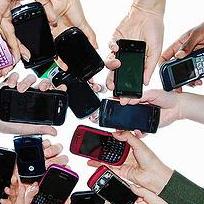 美國國家衛生研究院與布魯克黑文國家實驗室一項新研究指出,使用手機達50分鐘會使天線附近的大腦區域活動增加。
美國國家衛生研究院與布魯克黑文國家實驗室一項新研究指出,使用手機達50分鐘會使天線附近的大腦區域活動增加。
國家衛生研究院醫學博士沃爾科夫(Nora Volkow)所引領的一項研究發現,暴露在手機電磁波的大腦區域葡萄糖代謝加速,代表大腦區域性的活動增加。
此項研究發表在美國醫學協會期刊(JAME),是首篇有關使用手機與大腦葡萄糖代謝的臨床人體研究。
「使用手機達50分鐘與大腦區域性葡萄糖消耗量增加具有關聯性,意味著手機電磁波刺激大腦活動。」、「雖然目前手機通訊技術使得發射的電磁波很微量,但是仍對大腦具有影響。」國家衛生研究院大腦活動研究專家沃爾科夫說。
此項隨機對照研究於2009年整個年度進行,有47個健康的實驗參與者。
實驗進行時,兩支手機分別置放於受試者的左右耳,利用正子斷層掃描技術(PET)紀錄兩次大腦葡萄糖代謝活動的影像。其中一次紀錄時右耳旁的手機開啟使用,但關掉聲音,達50分鐘,而另外一次對照紀錄時兩耳邊的手機皆是不使用狀態。
科學家們發現,無論是在手機開啟使用或不開啟使用,整體大腦的代謝活動皆不具差異性。但是在靠近手機天線的大腦區域之活動量,比起大腦其他區域的活動量,則提高將近7%。
科學家們表示,無線電磁波(RF-EMFs)引起大腦葡萄糖代謝增加的機制尚未明瞭。
現今此項研究結果證明手機電磁波會影響大腦代謝活動,但是對於長期使用手機是否可能引起腦部癌症病變,則無法證明其關聯性。」作者指出還需要更多的研究確證。
關於長期使用更高電磁波能量的手機,比此項研究使用的手機還高,大腦葡萄糖代謝率是否會隨之增加?「使用手機,對於健康潛在的急性或慢性影響需要進一步證實。」華盛頓大學博士賴(Henry Lai)與瑞典大學醫院醫學博士哈德爾(Lennart Hardell)在沃爾科夫於JAME發表的論文所附加的編輯評論裡指出。
賴和哈德爾懷疑,沃爾科夫的研究團隊的發現,可能是大腦神經傳遞物質或腦神經化學活動受電磁波影響的指標。
史雷辛(Louis Slesin)在微波新聞裡指出,「此項新發現如經證實,低量的電磁波影響性過小可被忽略的主流思想,將會重新反思檢討。」
Using a cell phone for 50 minutes is associated with increased activity of the brain in the region closest to the phone antenna, finds new research by scientists at the National Institutes of Health and Brookhaven National Laboratory.
Elevated brain glucose metabolism, a marker of brain activity, showed up in a study designed to assess whether cell phone exposure affected regional activity in the human brain, led by Nora Volkow, MD, of the National Institutes of Health.
The study, published in today's issue of the "Journal of the American Medical Association," is the first investigation in humans of glucose metabolism in the brain after cell phone use.
"Fifty-minute exposure to a cell phone was associated with increases in glucose consumption by the brain, which indicates that the brain was being activated by the radiofrequencies from the cell phone," said Dr. Volkow.
"Even though the radiofrequencies that are emitted from current cell phone technologies are very weak, they are able to activate the human brain - they have an effect," said Dr. Volkow, a specialist in brain activity who serves as director of the National Institute on Drug Abuse and works with the National Institute on Alcohol Abuse and Alcoholism.
The randomized study was conducted between January 1 and December 31, 2009 at a single U.S. laboratory among 47 healthy participants recruited from the community.
Cell phones were placed on their left and right ears and brain imaging was performed with positron emission tomography, PET, scans. The imaging was used to measure brain glucose metabolism twice, once with the right cell phone activated but sound muted for 50 minutes - the "on" condition - and once with both cell phones deactivated - the "off" condition.
The researchers found that whole-brain metabolism did not differ between the on and off conditions. But metabolism in the brain region closest to the antenna was approximately seven percent higher for cell phone on than for cell phone off conditions.
The researchers say that the mechanisms by which radio frequency and electromagnetic fields, RF-EMFs, could affect brain glucose metabolism are "unclear."
With an estimated five billion cell phones in use around the world today concerns have been raised by the possibility that RF-EMFs emitted by cell phones may induce brain cancer.
This study's authors say more research is needed to answer that question.
"Results of this study provide evidence that acute cell phone exposure affects brain metabolic activity," the authors state. "However, these results provide no information as to their relevance regarding potential carcinogenic effects, or lack of such effects, from chronic cell phone use."
The results of this study add information about the possible effects of radiofrequency emissions from wireless phones on brain activity, write Henry Lai, PhD, of the University of Washington and Lennart Hardell, MD, PhD, of University Hospital, Orebro, Sweden, in an editorial accompanying the JAMA article.
"Although the biological significance, if any, of increased glucose metabolism from acute cell phone exposure is unknown, the results warrant further investigation," write Lai and Hardell.
"An important question is whether glucose metabolism in the brain would be chronically increased from regular use of a wireless phone with higher radiofrequency energy than those used in the current study," they write. "Potential acute and chronic health effects need to be clarified."
Lai and Hardell question whether the findings Volkow and her team may be a marker of other alterations in brain function from radiofrequency emissions, such as neurotransmitter and neurochemical activities.
"If so, this might have effects on other organs, leading to unwanted physiological responses," write Lai and Hardell. "Further studies on biomarkers of functional brain changes from exposure to radiofrequency radiation are definitely warranted."
Writes Louis Slesin in "Microwave News, "The new finding, if confirmed, would at the very least force a rethink of the prevailing orthodoxy, which maintains that low levels of RF and microwave radiation are too weak to have any effect and can be disregarded."
全文及圖片詳見:ENS報導


